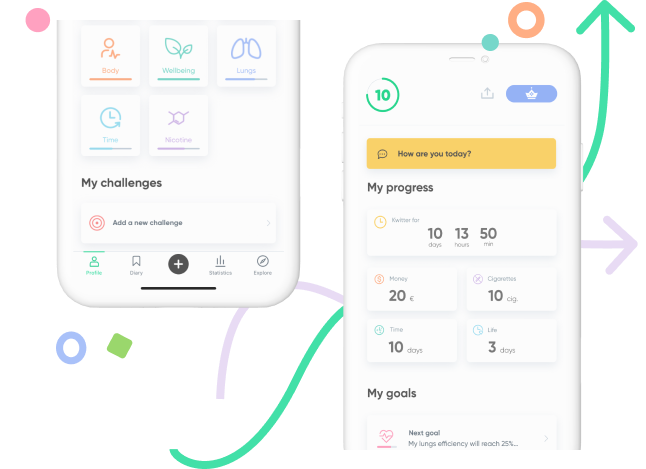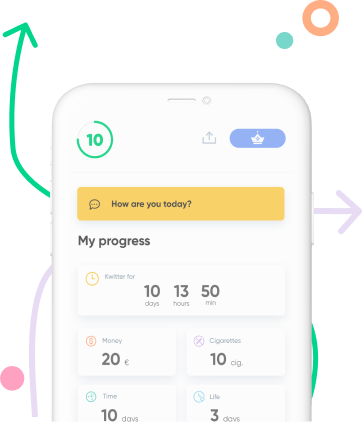June 19, 2020
Tips
Understanding your dependence: the starting point to quit smoking
In order to become and remain a nonsmoker, you must be adequately prepared! Attempting to quit smoking overnight, without first going through a preparation phase, will greatly reduce your chances of success. The first major step is understanding your addiction to be equipped to deal with it.
Tobacco addiction looks different for every smoker. That means that in order to successfully beat it, one must understand it. First, we will address what dependence is, the different forms it can take, and finally how Kwit can help you on your journey to quit smoking.
What is dependence?
First, let’s take a look at the composition of cigarettes. It’s impossible to make an exhaustive list of all the components found in one cigarette, because they contain up to 4,000 chemical compounds–of which at least 50 are carcinogenic.
Cigarette smoke is a mixture of gases and particles that form at a temperature of about 1,500°C(2732°F). It is this combustion that then releases toxic substances. The best known among these are:
tar
nicotine
carbon monoxide
flavoring agents
That being said, nicotine is not the only source of dependence: it onIy remains in your body for three days. However, if you have already attempted to quit smoking, you will know that withdrawal symptoms last longer than three days. That is because nicotine is not the only addictive factor.
By definition, dependence is: the inability to control one's behavior and the inability to quit despite an awareness of the risks associated with the behavior.
Keep on reading to learn more about dependence. 👇
The different forms of dependency
There are different forms of dependence: physical, psychological and behavioral. A smoker can be addicted in all three ways.
Physical dependence
Physical dependence is mainly due to the lack of nicotine. This craving leads to irritability, nervousness, anxiety, difficulty to sleep, etc.
It can be reduced with nicotine substitutes, such as gums or patches. These can help combat withdrawal symptoms, which can be quite strong at the beginning of one’s tobacco quitting journey.
Psychological dependence
Psychological dependence refers to the emotions and release thereof associated with smoking. Indeed, smoking often allows people to take a pleasant pause, and manage their stress.
Psychological dependency often manifests itself in the form of fears or beliefs. Amongst those are the fear of quitting smoking, the fear of gaining weight and the fear of a feeling of a craving.
Psychological dependency usually appears shortly after one first smokes their first cigarette and looks different from one smoker to another. Each person is unique when it comes to their addiction.
In order to help you manage the psychological grip of addiction, Kwit provides you with valuable advice in many blog posts. For example, we wrote one on smoking and stress, or another one on smoking and weight gain.
Behavioral dependence
Behavioral dependence is related to habits and rituals. Whether it stems from the hand-to-mouth gesture or social habits, when behavioral dependence sets in, smoking a cigarette becomes automatic. In other words, many smokers do not know why they smoke: it is a ritual.
Preparing an avoidance strategy for when the urge to smoke arises is the best way to combat this dependency. For example, one could substitute their coffee/cigarette break with tea and a short walk.
Ultimately, when it comes to behavior related to social relations, you must learn to live in your usual environment without resorting to smoking. To do this, choose non-smoking areas to go out with friends and stay with nonsmokers to reduce potential temptation. This phase does not last: while you must be vigilant at the beginning of the withdrawal process, you will quickly relearn how to live without tobacco.
I am testing my dependence
In order to assess your level of dependency, you can take the Fagerström test, a test that rates your dependence on a scale of 1 to 10. If you are above 4 you can consider yourself highly addicted to cigarettes. The use of nicotine substitutes may be a way of achieving long-term cessation. However, we advise you to consult a professional before using substitutes.
How to interpret your results:
0 to 4: Your dependence is low
You are a smoker but you are not physically dependent on tobacco. You can quit smoking without using nicotine substitutes. If quitting seems daunting, we suggest focusing on changing your habits:
throw away your ashtrays, lighters, and anything else related to cigarettes,
go get some fresh air when the idea smoking arises,
drink water to get rid of a craving.
You can do it! And thanks to Kwit, you can get motivational messages and reminders whenever you need them. Even if you're not a big smoker, you'll unlock levels in the app very quickly!
5 to 10 : Your dependence is strong
The results show that you are highly dependent to tobacco. Don't panic, we will give you several tips to help you quit smoking.
We know you can do it! The Kwit app will be of great help to you. Cognitive and Behavioral Therapy (CBT) help you understand your addiction and how to overcome it. 💪

Smoking cessation yourself off cigarettes with CBT
In order to help you quit smoking, Kwit uses Cognitive and Behavioral Therapy, a drugs-free approach that aims to:
Identify the mechanisms behind the difficulties associated with quitting
Experiment with new behaviors
Gradually get out of vicious circles that perpetuate and aggravate psychic suffering
Cognitive and Behavioral Therapy allows you to better understand the negative thought patterns that lead to unwanted behaviors such as dependence, which in turn can cause mental distress.
Kwit helps you understand your addiction by providing you with detailed statistics on your addiction. Kwit also gives you different avoidance strategies to overcome your addiction.
For more information on CBTs, visit here.




